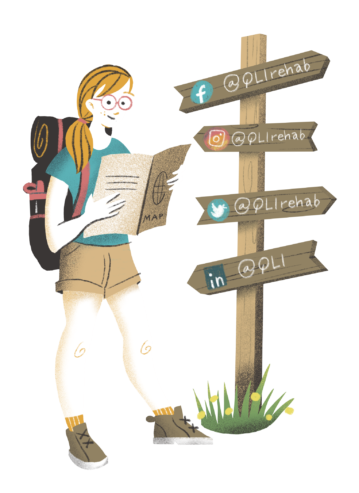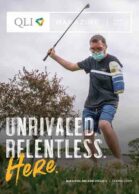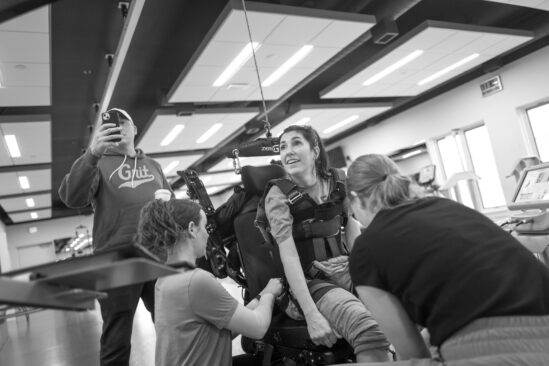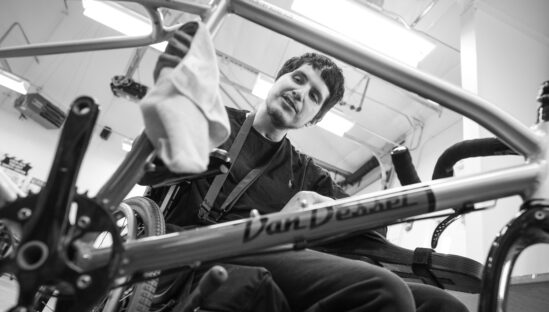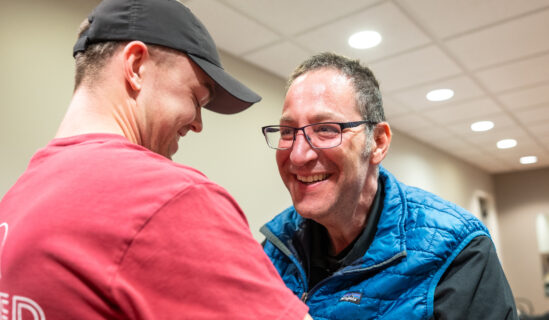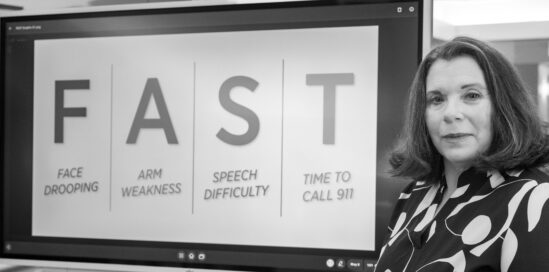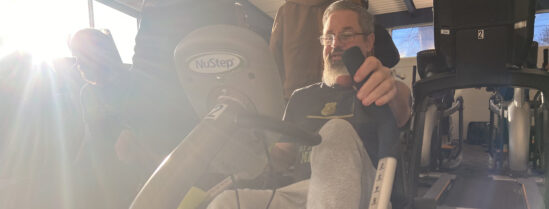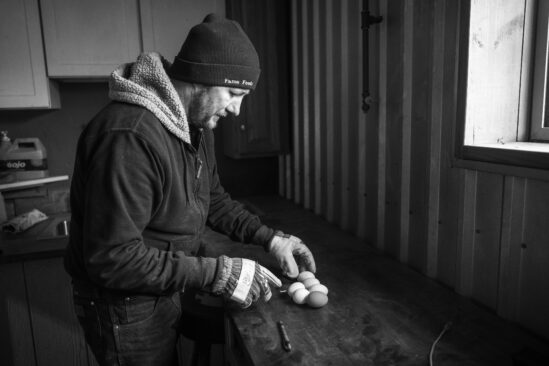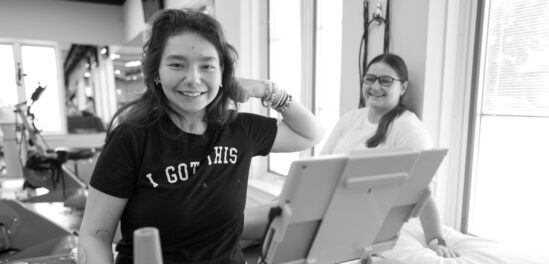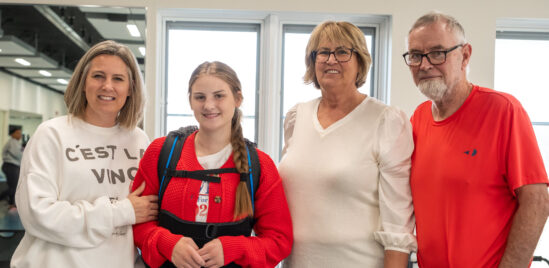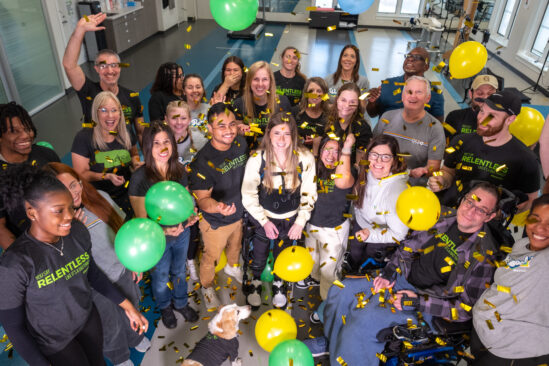The lights are dimmed in the common area—the snow outside brings up the visibility within the room. It’s just after four o’clock in the afternoon, usually the time of day when clients return to the house after a long day of therapy. Only today, the room is much more crowded than usual. It’s a whole spectrum of QLI—in the halls just outside, in the kitchen making sure the pizza for the festivities is ready to go, or setting up the karaoke machine against the back wall, with a “check-check” ensuring everything is in order—the stage is set.
Everyone is here—rehabilitation trainers, house coordinators, service coordinators, nurses, physical and occupational therapy team members, speech and community integration team members, life path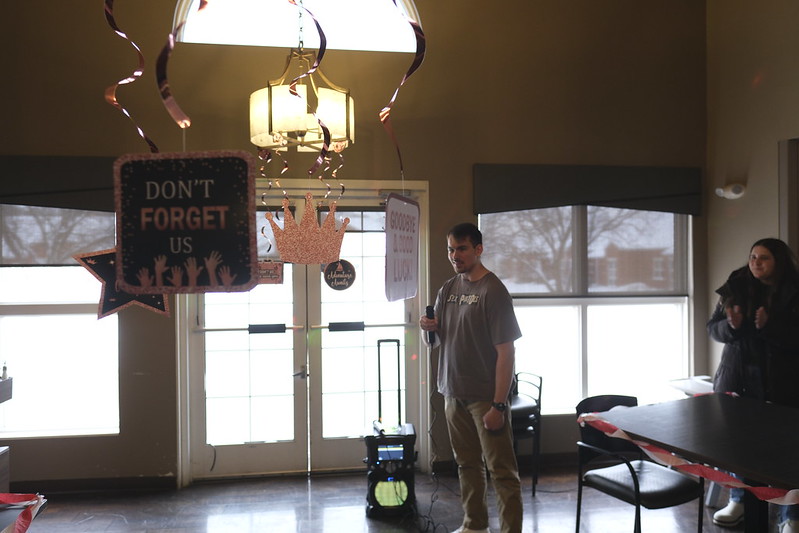 specialists, members of QLI’s front office team, and the public relations and development team. Dozens of true and dedicated friends, family, and supporters gather for the man of the hour.
specialists, members of QLI’s front office team, and the public relations and development team. Dozens of true and dedicated friends, family, and supporters gather for the man of the hour.
“Lucas!” calls speech-language pathologist Zoey Devney, “what song do you want?”
Lucas Smith, for whom this going away party is being held, looks up from the cards he’s been reading and the conversations he’s been having. Without skipping a beat, he strides confidently to the machine and snatches the microphone, standing tall and at attention, waiting for the first chords of the song to begin. “‘Rooster’ by Alice in Chains,” he requests.
The low dual thrum of Mike Starr’s bass rumbles through the karaoke speaker, the rhythm almost a descent, before being met by the high whine of Jerry Cantrell’s guitar. Lucas looks all around, taking in the proud and beaming looks of everyone gathered. Then, where we are so used to Layne Staley’s trademark grunge growl, comes Lucas’ voice out to the forefront.
“Ain’t found a way to kill me yet…”
Amongst the many things adorning the center light in the room is a small banner that says simply, “Don’t Forget Us.” Indeed, it will be hard for Lucas to forget QLI, just as the memory of his journey will last long in the memory of all these gathered. “It seemed like yesterday,” though cliché, is an apt description of the sentiment. 2023 flew by, but what happened within it for Lucas wasn’t a mere blip or a puzzling year with which the mind is troubled to recall anything of consequence that occurred. 2023 was consequence. 2023 was discovery, was growth, was illuminating. A list of adjectives reflecting the truth would run the mark of pages and pages, and every one of them would be apt and in many respects, understatements.
Lucas became Lucas while at QLI in 2023.
“Seems every path leads me to nowhere…”
Behind him, through the doors of the house, he arrived in January 2023. In a wheelchair, gaunt and tired, to Lucas then everything was like a dream, in fact thinking he was in one—that the time would come when he’d wake up. The past months were hazy and not altogether clear to him why he, a college freshman at Northwestern University in Chicago, was in a post-acute rehabilitation facility in Omaha, Nebraska.
The residential team’s support was imperative in these early days for Lucas, providing an environment where rehabilitation trainers could introduce him to daily routines, and would always be a consistent presence for him. He could learn their names and faces at a slow pace, pick up on their personalities,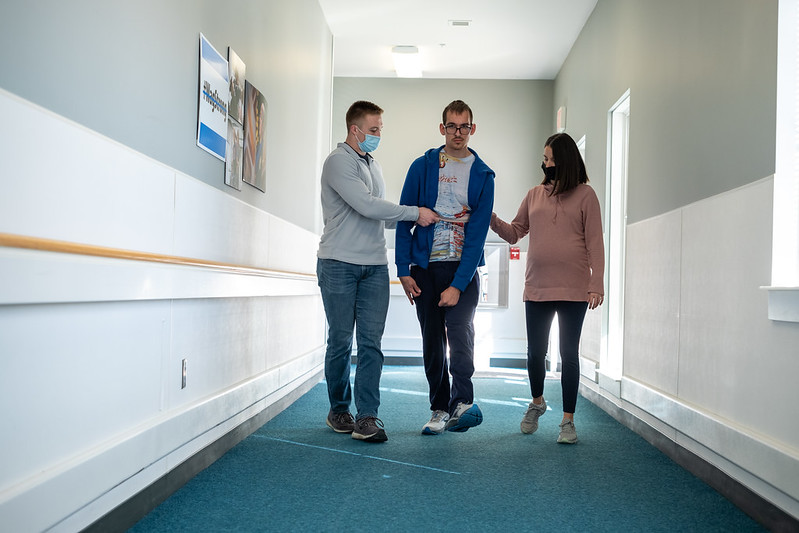 and establish fundamental trust. The state that Lucas was in is known as post-traumatic amnesia (PTA), a state after a severe traumatic situation or injury where the brain has great difficulty learning and storing new routines, necessitating an increased amount of support.
and establish fundamental trust. The state that Lucas was in is known as post-traumatic amnesia (PTA), a state after a severe traumatic situation or injury where the brain has great difficulty learning and storing new routines, necessitating an increased amount of support.
Crucial in this stage was continuing physical rehabilitation with physical therapist Sammy Porter and a gait belt around his waist, Lucas walked, stimulating his legs and reestablishing the feeling. At first and still in his chair, he required full support to go from therapy to therapy, session to session, every day. For one such session he’d be taken to the Colladay Center and meet with someone, he wasn’t sure of her name. They’d talk for around fifteen minutes—that was the upper limit to the kind of sustained conversation he could handle. He expressed to her he felt like he was in a dream, he didn’t understand why he was here. Lucas’ phone was filling up constantly with calls and texts from friends and family, offering their wishes, sending their love—being there for him, but none of it made sense. Then it was over to the Lied Life Center for some time, then back to the house to relax for the remainder of the evening.
One day in the house, he saw her passing through on her way to meet with another client—it clicked.
“He said, ‘You’re Pamela—you’re one of my therapists,’” remembers Dr. Pamela Payne, part of QLI’s psychology team. Though the memory-making process was starting again, the nature of why he was at QLI remained a hazy mystery. In starting to communicate more with friends and family the pieces began to form—who Lucas was before injury grew clearer, yet it seemed distant and foreign, for it wasn’t him.
When transitioning from high school to college, Lucas had a high mind for what he wanted to accomplish, though these were ideas that were not for him, but rather for others—getting a highly successful and lucrative job, marrying, and all the trappings of what can be sold to some as what an “ideal life” looks like, instead being an utterly unobtainable standard. At his core, Lucas did not want this but wanted it because he felt it was expected of him. This, combined with the distance from himself and his close friends and family, led to Lucas attempting suicide in fall 2022.
Returning and “awakening” from the PTA, having a traumatic brain injury, and knowing the cause, was simply brutal. Lucas, fortunately, had support from every corner—
The rehabilitation trainers leading the development of his functional everyday routines,
The physical rehabilitation team working with Lucas to build back strength, endurance, and function as he transitioned from a wheelchair to a rollator walker and finally to walking completely independently around campus,
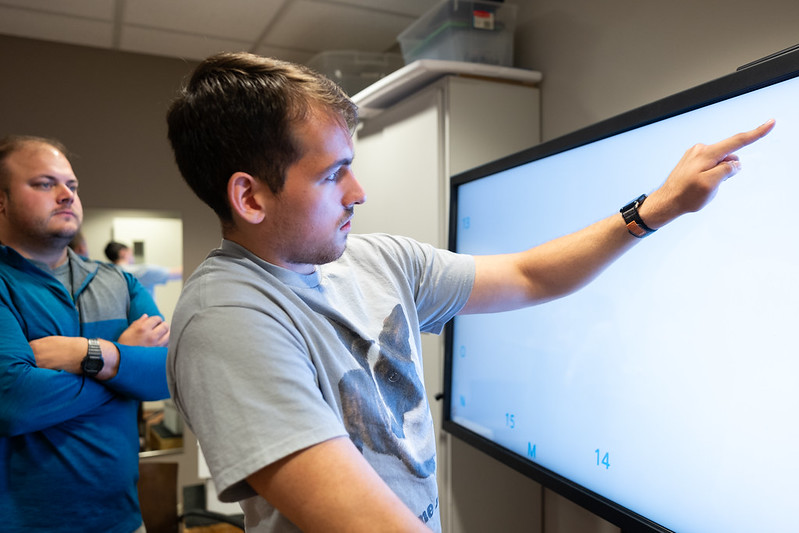 Occupational therapy ensuring his success in mastering activities of daily living,
Occupational therapy ensuring his success in mastering activities of daily living,
The life path specialists giving him time and space to explore his passions, from video games to making music, and building a meaningful path back to life,
The nurses ensuring a diligent medication schedule in coping with anxiety and depression, and learning how to take care of his health and advocate for his care,
The speech team guiding him through techniques and strategies to work through his dysarthria, from the simple hellos and conversations woven through every day of his program, as well as his cognitive recovery,
So many others from every corner of QLI that otherwise may not have had much interaction with him.
Everyone.
“Here they come to snuff the rooster…”
The Lucas that emerged throughout 2023 wasn’t a “new Lucas,” but a part of him that was always there in some way was revealed in full, now with the full self-awareness and confidence to recognize this and to take value in what he wants his life to look like for the future. Lucas matters and that fact is crystal clear to him. The natural social environment of QLI meant there was always the ability to master the techniques he acquired through therapies.
One of Lucas’s key goals was returning to college. Through a mock-college program, constructed by Dr. Payne and Zoey, Lucas was able to trial returning to the rhythm of classwork, establishing healthy study habits, critical thinking, and crucially—self-reflection. While ample opportunity for reflection came from his assignment work, Dr. Payne encouraged Lucas to branch out and interview other QLI clients. Such a project had many benefits for Lucas. First, it served a very practical exercise in scheduling times to interview the clients and to thoughtfully write the questions he would ask—akin to classwork that would be expected in a college class.
Additionally, the fifteen minute sessions that defined the early days of recovery grew to full hour-long discussions with Dr. Payne, creating opportunities for Lucas to grow his confidence. Through identifying frustrations that arose throughout the day, Lucas began to implement grounding techniques, and not letting the in-the-moment obstacles interrupt a physical therapy, life path, or adaptive sports session. “For Lucas,” notes Dr. Payne, “music played an important role in his life—it was a calming element. So, in times when aspects of sessions may appear overwhelming, Lucas could mentally capture and focus on those things which gave him great joy—reorienting himself to the task at hand.”
Along with speech pathologist Zoey Bertsch, Lucas worked through placing a filter on himself for social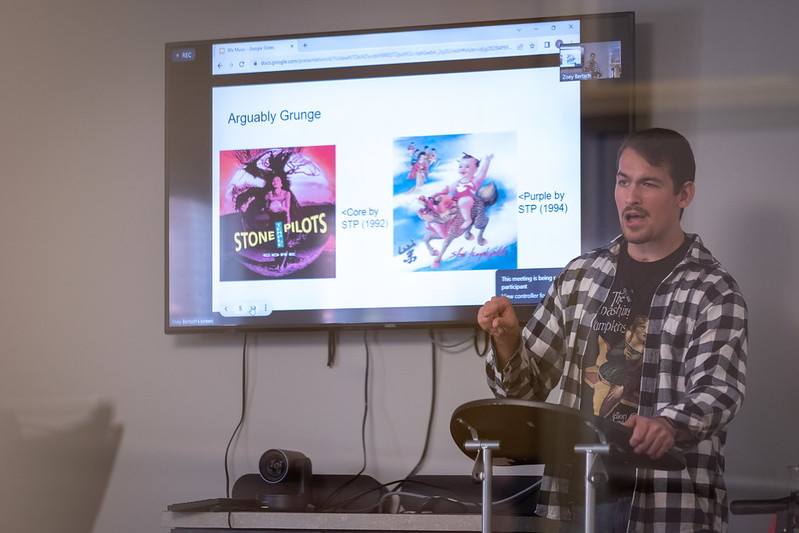 interactions and conversations, building repetitions and expectations for what professional relationships and conversations look like. As his social ability progressed, it led to sessions off campus with team members or other clients, giving him many opportunities to the strategies into practice. “Lucas and I would prep before these,” says Zoey, “and would determine how best to approach the situation and what environment we’ll be in, asking what’s appropriate or not to discuss there. Afterward, we’d revisit, and Lucas was never afraid to ask questions or take feedback—exploring more social interaction is very important to him.”
interactions and conversations, building repetitions and expectations for what professional relationships and conversations look like. As his social ability progressed, it led to sessions off campus with team members or other clients, giving him many opportunities to the strategies into practice. “Lucas and I would prep before these,” says Zoey, “and would determine how best to approach the situation and what environment we’ll be in, asking what’s appropriate or not to discuss there. Afterward, we’d revisit, and Lucas was never afraid to ask questions or take feedback—exploring more social interaction is very important to him.”
“I’ve seen a side of myself that I wasn’t able to before,” Lucas realizes. “Sure,” he grins, “becoming a rich man may be cool, but being a kick-butt guy is even better.” In returning home to Massachusetts, he’ll begin Boston University’s Intensive Cognitive and Communication Rehabilitation (ICCR) program. Designed to provide a learning environment for individuals with acquired brain injuries through a full semester, this is just the first stepping stone for Lucas—the beginning of better days.
“You know he ain’t gonna die…”
After the pizza and cake were passed around and imbibed, Lucas sat back with his dad, enjoying the moment, taking in the expanse of the day (and the past year). One by one, as people filter out and go off into the evening, they stop one last time to hug him, wish him well, and say goodbye. It is goodbye for seeing him around campus, to his fistbumps and greetings, the sarcastic deadpan humor, but more importantly, a hello to something greater that lies waiting for him at home—the rest of his life, which is so earnestly earned.


